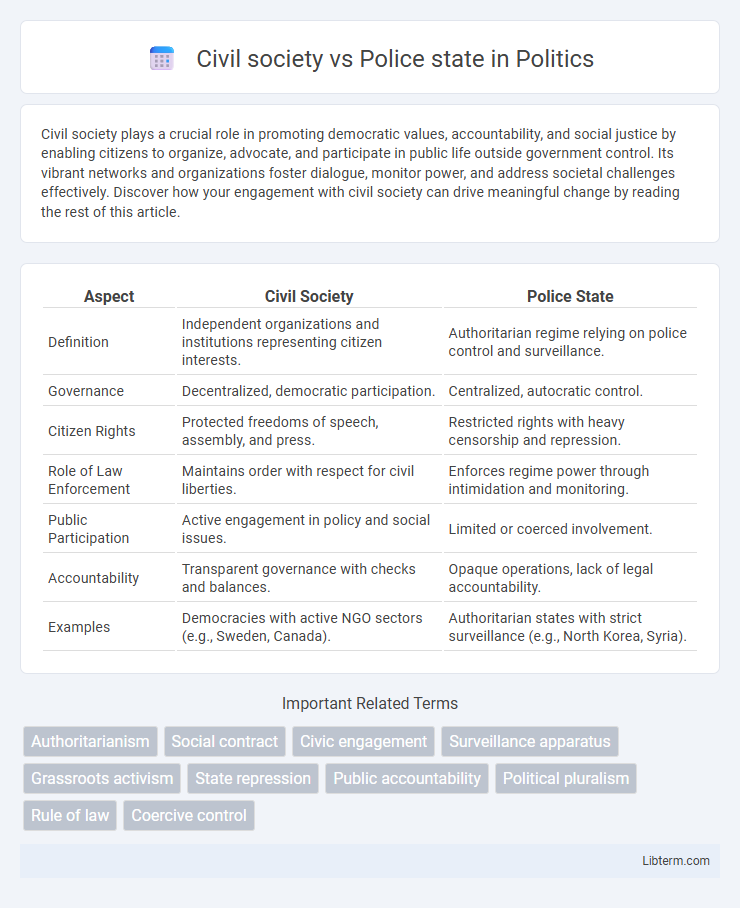Civil society plays a crucial role in promoting democratic values, accountability, and social justice by enabling citizens to organize, advocate, and participate in public life outside government control. Its vibrant networks and organizations foster dialogue, monitor power, and address societal challenges effectively. Discover how your engagement with civil society can drive meaningful change by reading the rest of this article.
Table of Comparison
| Aspect | Civil Society | Police State |
|---|---|---|
| Definition | Independent organizations and institutions representing citizen interests. | Authoritarian regime relying on police control and surveillance. |
| Governance | Decentralized, democratic participation. | Centralized, autocratic control. |
| Citizen Rights | Protected freedoms of speech, assembly, and press. | Restricted rights with heavy censorship and repression. |
| Role of Law Enforcement | Maintains order with respect for civil liberties. | Enforces regime power through intimidation and monitoring. |
| Public Participation | Active engagement in policy and social issues. | Limited or coerced involvement. |
| Accountability | Transparent governance with checks and balances. | Opaque operations, lack of legal accountability. |
| Examples | Democracies with active NGO sectors (e.g., Sweden, Canada). | Authoritarian states with strict surveillance (e.g., North Korea, Syria). |
Defining Civil Society and Police State
Civil society refers to the collective organizations, institutions, and networks that operate independently from the government, fostering citizen participation, social trust, and accountability. A police state is characterized by centralized government control exercised through extensive surveillance, repression, and the limitation of individual freedoms by law enforcement agencies. While civil society promotes democratic engagement and rights protection, a police state prioritizes control, often undermining civil liberties and transparency.
Historical Contexts of Civil Society and Police States
Historical contexts of civil society reveal its roots in ancient Greece and Enlightenment Europe, where autonomous associations fostered political participation and social accountability. Police states, by contrast, often emerged during totalitarian regimes in the 20th century, characterized by centralized control, surveillance, and suppression of dissent, as seen in Nazi Germany and the Soviet Union. Civil society promotes pluralism and democratic governance, while police states prioritize state security and limit individual freedoms to maintain power.
Key Characteristics of a Civil Society
A civil society is characterized by active citizen participation, protection of individual rights, and the presence of independent organizations that operate free from government control. It fosters transparency, accountability, and rule of law, ensuring that power is decentralized and public interests are prioritized. Unlike a police state where government surveillance, coercion, and suppression dominate, a civil society promotes dialogue, diversity, and social trust.
Identifying Traits of a Police State
A police state is characterized by pervasive government surveillance, suppression of political dissent, and a lack of transparent legal processes. Civil liberties such as freedom of speech, assembly, and privacy are severely restricted under police state regimes. The use of secret police forces to enforce conformity and the absence of independent judicial oversight are key indicators distinguishing a police state from a functioning civil society.
The Role of Law and Individual Rights
Civil society depends on the rule of law to protect individual rights, ensuring freedom of expression, assembly, and privacy while maintaining accountability and transparency within government institutions. In contrast, a police state often overrides legal protections, using surveillance and arbitrary enforcement to suppress dissent and curtail personal freedoms. The balance between law and individual rights distinguishes a society governed by justice from one dominated by authoritarian control.
Social Trust vs. State Surveillance
Civil society thrives on social trust, where communities engage in mutual cooperation, transparency, and shared norms, fostering civic participation and individual freedoms. Police states rely heavily on state surveillance to maintain control, which erodes trust as citizens feel monitored and constrained, leading to social fragmentation and diminished public confidence. The balance between civil society and police state dynamics significantly impacts social cohesion and the legitimacy of governance structures.
Political Participation and Public Dissent
Civil society fosters political participation by encouraging citizens to organize, express opinions, and influence policy through peaceful means, thereby strengthening democratic governance. In contrast, a police state suppresses public dissent by imposing strict controls, limiting freedoms of speech and assembly, and using surveillance or force to prevent opposition. The dynamic between these two models significantly impacts the level of civic engagement and the capacity for societal accountability in governance.
Media Freedom and Information Control
Civil society thrives on media freedom, enabling independent journalism and unrestricted information flow that hold authorities accountable and promote transparency. In contrast, a police state enforces strict information control through censorship, surveillance, and suppression of dissenting voices, undermining public trust and restricting access to unbiased news. Control over media in police states serves as a powerful tool to manipulate public perception and maintain authoritarian power.
Impacts on Economic Development and Innovation
A vibrant civil society fosters economic development and innovation by promoting transparency, accountability, and collaborative problem-solving, which attract investment and encourage entrepreneurship. In contrast, a police state often stifles creativity and economic growth through oppressive surveillance and restrictive policies that limit individual freedoms and market dynamism. Research indicates countries with robust civil societies experience higher innovation indices and sustainable GDP growth compared to authoritarian regimes.
Safeguarding Democracy: Paths Forward
Civil society acts as a fundamental pillar in safeguarding democracy by promoting transparency, accountability, and citizen participation in governance, countering the oppressive tendencies of a police state that relies on surveillance and coercion to maintain control. Strengthening independent institutions, protecting freedom of expression, and encouraging civic education are critical pathways to prevent authoritarianism and ensure democratic resilience. Empowering local communities and fostering dialogue between the public and law enforcement can create checks and balances that uphold rule of law and human rights.
Civil society Infographic

 libterm.com
libterm.com